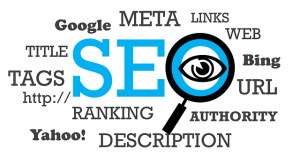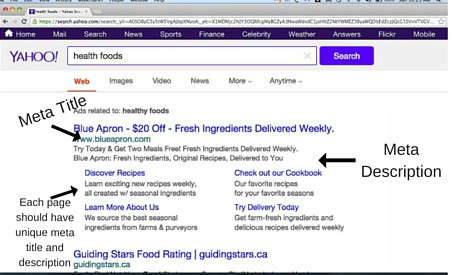So you’re thinking of creating a website or maybe you already have one. Maybe you have a specific niche, an e-commerce store, a blog, a website, any online business… you’re probably wondering how to get people to your site.
 I’m sure by now, you heard you need to have this thing called SEO. You know you need this to get traffic to your site and get business.
I’m sure by now, you heard you need to have this thing called SEO. You know you need this to get traffic to your site and get business.
Understanding SEO for beginners may seem intimidating and hearing the word SEO seems scary and technical!.
Today, I want to tell you how easy it really is to understand SEO. First, everyone wants their online business noticed on the first page of search engines. The problem is when someone searches for your “Best Scuba Dive Spots” post, there are thousands of other blog posts on that, all wanting the same thing. How will your traffic find you?
This is where SEO comes in…
Here are some of the main common terms to help you understand SEO
1. SEO (Search Engine Optimization)
- The art of getting traffic to your blog post and pages on your website so that it will show in the top listings on your search engines. You’re going to get more people coming to your site, buy your products and do whatever your call to action is by being in this position.
- Google, Bing, and Yahoo – major search engines.
2. SEM (Search Engine Marketing)
- A variety of different internet marketing techniques to get people to notice you in the search engines. This includes SEO, On-Page SEO, Off-Page SEO, pretty much the whole ingredients of internet marketing to get your page or blog ranked in search engines.
3. On-Page SEO
- These are the things you do on your site to get your pages and posts ranked like Meta Titles, Meta Descriptions, content creation, internal linking from one page to another, image alt text, etc. These are all the things that affect search engine rankings.
4. Off-Page SEO
- The things you do OFF your site to get it ranked in the search engines like social media posts (Facebook, Twitter, Google+, Instagram, Pinterest). They’re the things to get traffic coming TO your site. Also, commenting on other people’s sites so that you can get links coming back to your site.
5, PPC (Pay Per Click)
Of course, we all want to get traffic naturally for free but there are many reasons to consider PPC:
- A method of advertising on the internet which can greatly benefit you because it’s used to bring traffic to your website. This helps the search engines to put your listing at the top. It’s like a silent auction.
- Using Google, Bing, or Yahoo search engines, advertisers bid on keyword phrases meaningful to their target market.
- Every time the ad is clicked by a visitor, the advertiser pays the website owner based on the cost per keyword.
TIP: The ad must be well-written.
6. SERP (Search Engine Result Page)
- This is the page(s) that’s displayed in response to when you search for something in your search browser. Say you Google ‘how to grow tomatoes’, you will see a bunch of listings on that… these listings are the search engine result pages.
7. Meta Title
- This is basically the article title, that is, your post or page title for the search engines.
- This is done in WordPress’s All in One SEO plugin.
- The Meta Title shows up in SERP when you google for something. All the page titles you see there are your meta titles.
8. Meta Description (optional, a lot of power, totally underutilized!!!)
- You don’t really need to put a description. I do this because it’s a description about the page or post for the search engine and it shows up in the SERP… very important!!
- It’s your opportunity to make your first impression in the search engine. I see a lot of SERPs that don’t have a description. I think there should be a unique meta description on every web page and post. It should have your primary keyword in it too. The words should be encouraging to the searcher to click to your page.
- If you don’t enter a meta description, Google will extract data from your page and simply pop it in there whether you like that for a description or not.

9. CTA (Call to Action – SUPER IMPORTANT!)
- It’s important to tell your visitors what you want them to do at the end of your page or post. Example, ‘Click here for your FREE gift’, ‘leave me a comment, I would like to hear from you’, ‘click here to purchase your football snack helmet’, ‘for further information, click here’, ‘enter your email here to get your secret on growing tomatoes’.
- For each and every article you need to have an end result. Writing a great article and not telling your visitors where you want your traffic to go, well… it’s a huge missed opportunity and a waste of your time spent writing. What are they supposed to do next?
10. Internal Links
Search engines rank individual pages, not the entirety of websites in SERPS. All the more reason why internal links are extremely important.
- An Internal Link takes the visitor to another page on the same website. For example, putting a link from your About Page to Page B on the same URL.
- Gives ranking power through the entire website.
- Spreads page authority.
- Helps in website navigation.
- Establishes the architecture and hierarchy of a website.
- You can have good targeting keyword, amazing content, and intelligent marketing but without these internal links, these ‘spiders’ have nothing to link to. No prolonged stays for your visitors… no tight weave network of pages and posts. Google values internal networking.
11. External Linking
- In simple terms, it’s a link that goes away from your page and goes to a page from a different website. Similarly, there can be another website that links to yours, i.e. you link to another page that is off of someone else’s website.
- Example, linking from your site page to Wikipedia.
12. Anchor Text
- These are the clickable and visible texts .You are using words that are used to link to something, say page A to page B on your own site or you’re using words to link to an external link.
- The link can be an internal or an external link.
- Example: ‘Click here for your FREE gift’, ‘Click here if you want to learn more’, ‘Click here to buy from Amazon’. These words are the anchor texts.
- Search engines use the anchor text to govern what the target page is all about.
13. Conversion
- Conversion is a targeted goal like a lead, a sale, a call… anything that achieves your end result. The end result is what you want your traffic to do after they read your content.
- Related directly to a Call to Action.
14. Conversion Rate
- This is a ratio between the number of people who actually land on your page and perform the actual, desired action. The action can be something like a sign up to something, buy something….
- Example, you have 100 people who visited your site page and 2 people purchased. Your conversion rate is 2%
So, this is it in a nutshell… When I decided to have my very own online business, there was so much I didn’t really understand about SEO and I felt extremely intimidated. I knew I needed to get traffic but how…? Plus, I didn’t want to get scammed. I didn’t know where to go and how to get started… until I stumbled upon Wealthy Affiliate. Believe it or not, I actually created my niche website in less than 45 seconds using their WordPress Express (ONLY 3 steps) ! Check it out and get your FREE lessons here!!
I hope all the SEO terms I put here for you makes sense! If you have any questions or comments, I really would like to hear from you.

Very good post. Lot’s of great information. very good for beginners and the advanced people.
Hi Pat,
Thank you for your comment! I learned a lot about SEO from Wealthy Affiliate. I started out as not knowing anything about having an online business and realized it’s not as scary as I thought!
Hi Monica,
That’s a pretty thorough lesson you have posted there. It’s interesting to note that I am familiar with SEO, but…and this is a big but, I constantly fail to utilize the Meta description.
Is it true that Google still gives you points for this?
thanks
Carl
Hi Carl,
Thank you for your comment and question! Meta description in my opinion, is really important because it’s our first opportunity to tell people what our page or post is about. It’s not all that important to rankings but important on click thru rates when our page or post shows up in the search engine result pages. I think of Meta description like a place to put an ad copy in for my articles. A lot of people will simply let their first sentence be used as their meta description and it really has very little to do with the actual article they’re trying to rank. I know that if the meta description doesn’t make sense even if it was ranked first place, I’ll still scroll down to what done make sense. Time is precious to many of us.. clicking on something that’s give us what we’re looking for… something that’s relevant is the key.
I hope this helps answer your question Carl! Let me know if you have any other questions!
Best!
This is all very useful information for those getting started with internet marketing; as well as those that have been around for a while. I myself have been around for a few years and still got some value from this post.
I didn’t know how important a meta title and meta description were to my website. Now I understand why when I see snippets of my website, it’s all random sentences. Looks like I need to go back and fill in some meta descriptions so my posts make sense when people see them in the search engines.
Thanks for the insight,
Diana
Hi Diana,
Thank you for your comment and you’re very welcome! I’m glad you got value from this post! Yes… Meta title and Meta descriptions are very important and especially the Meta Description because it’s our initial opportunity to visually tell people what our page or post is all about.I think of the Meta description like placing an ad copy of my article.
Even taking a look at what some of your competitors are putting in their meta description is very interesting…and helpful!
Thanks again Diana!
Best!
Best!